Best Bagpipe
for Beginners
-
Overall: 10/10
-
Best Feature: Includes a set of drone reeds
-
TedScore™: 10/10
Best Versatile
Bagpipe
-
Overall: 10/10
-
Best Feature: Made from premium African blackwood
-
TedScore™: 10/10
Best Budget
Friendly Bagpipe
-
Overall: 9/10
-
Best Feature: Includes a synthetic pipe bag
-
TedScore™: 9/10
Are Bagpipes Hard To Play?
Let’s be honest: bagpipes aren’t your everyday instrument, and learning to play them might seem harsh. Mastering bagpipes can be challenging, but don’t let that discourage you!
The journey of learning to play bagpipes is full of joy, culture, and fun. As someone who has experienced those initial wailing sounds, I can assure you it’s a rewarding experience.
Are you ready to explore what makes bagpiping such an exciting adventure? Let’s get started!
Understanding Bagpipes
If you’re interested in learning how to play bagpipes, it’s important to understand the different components and types available. Here’s a breakdown of what you need to know:
Components of Bagpipes
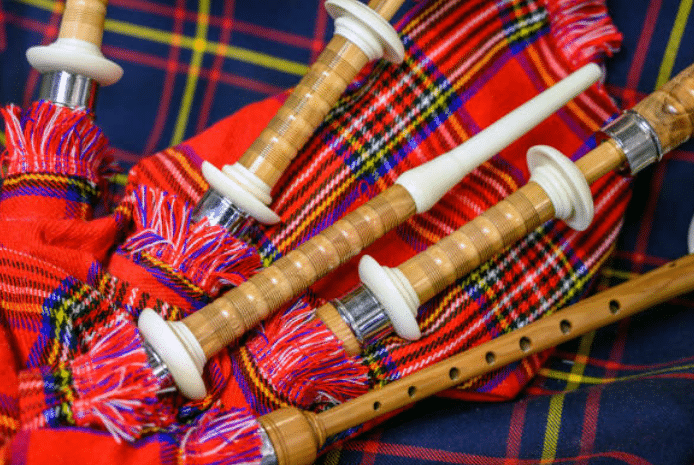
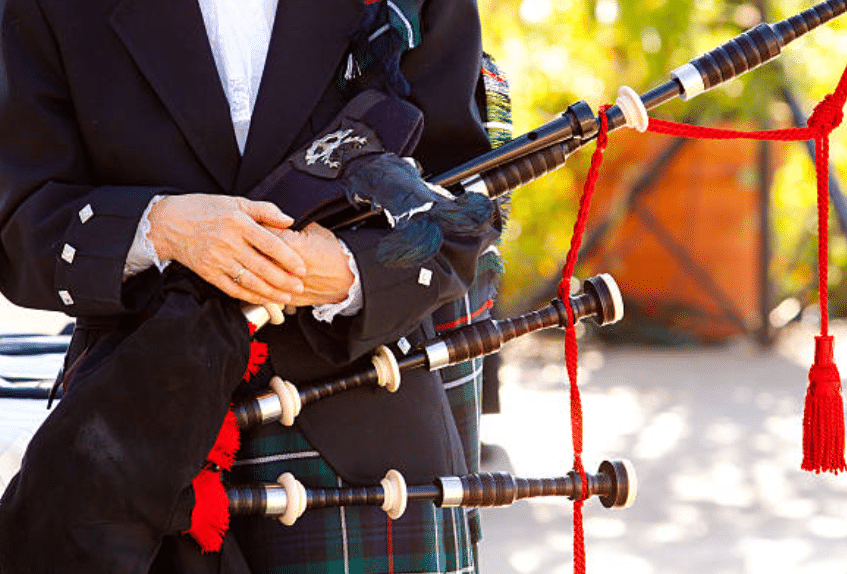
- Pipes: The pipes are the long, wooden tubes that make up most of the instrument. They’re typically made from African Blackwood, but other materials like plastic and cocobolo are also used.
- Chanter: The chanter is the part of the bagpipe that produces the melody. It’s a long, thin pipe with finger holes that the player uses to create different notes.
- Drones: Drones are the three long pipes at the top of the bagpipe. They produce a constant, low-pitched sound that provides the instrument’s distinctive background noise.
- Bag: The bag is the instrument part the player blows air into. It’s typically made from sheepskin or synthetic materials.
- Practice Chanter: The practice chanter is a smaller version that beginners use to learn the basics of playing the bagpipes.
Types of Bagpipes
There are several different bagpipes, each with its unique sound and playing style. Some of the most common types include:
Highland Bagpipes: The Highland bagpipes are the most well-known type of bagpipe and are often used in Scottish and Irish music. They have a loud, powerful sound and are typically played at outdoor events like parades and festivals.
Smallpipes: Smallpipes are a quieter, more mellow version of the bagpipe. They are often played indoors and are popular for more intimate events like weddings and funerals.
Border Pipes: Border pipes are a type of bagpipe that originated in the Scottish Borders region. They have a unique nasal sound and are often used in traditional Scottish folk music.
Learning to Play the Bagpipes
Starting with a Practice Chanter
If you’re a beginner, starting with a practice chanter is best. A practice chanter is a smaller version of a bagpipe music chanter that allows you to learn the finger movements and notes before moving on to the full bagpipes.
You can find practice chanters at most music stores or online. When you first start playing the practice chanter, it’s important to focus on learning the fingerings for each note.
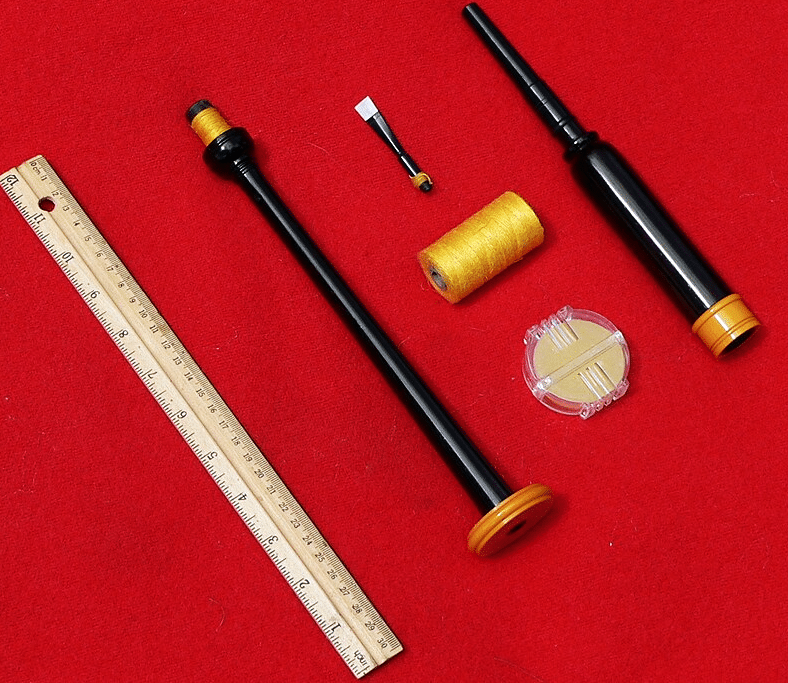
It may take some time to get used to the finger movements, but with practice, you’ll get the hang of it. A good start method is practicing scales and simple tunes, such as “Mary Had a Little Lamb.”
Progressing to Full Bagpipes
Once you’ve mastered the practice chanter, you can move on to the full bagpipes. It’s important to note that playing the full bagpipes requires a lot of physical effort, as you need to blow air into the bag while simultaneously squeezing it with your arm to create sound.
When you first start playing the full bagpipes, it’s best to start with simple tunes and exercises. You can find instructional videos online or consider taking lessons from a professional bagpiper. Practising regularly and being patient with yourself as you learn is important.
Teaching yourself to play the bagpipes is possible, but seeking instruction from a professional is recommended. A teacher can guide proper technique and help you progress faster.

Challenges in Playing Bagpipes
Maintaining Steady Airflow
Achieving Correct Pitch and Tone
Physical Stamina and Coordination
Our Top 5 Bagpipes for Beginners
AJW Bagpipes Set
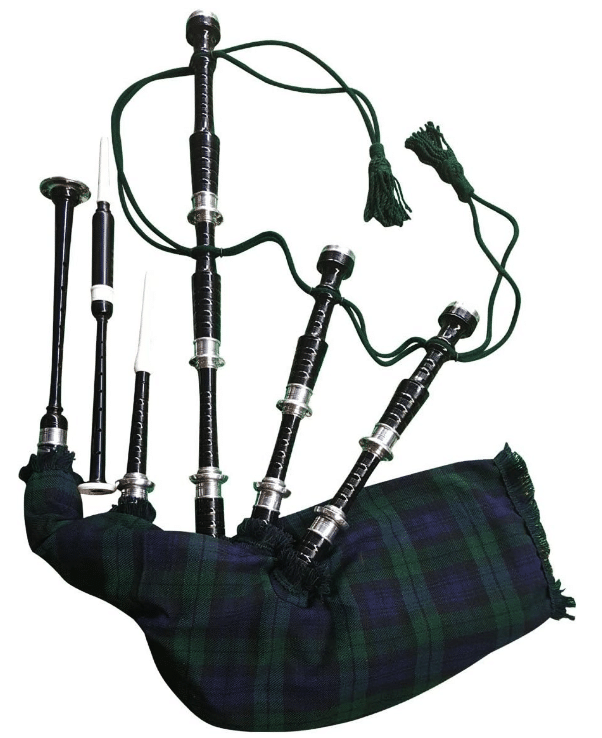
FEATURES:
- Made of high-quality African blackwood
- Comes with a synthetic pipe bag
- Includes a set of drone reeds
AJW Bagpipes Set
- Produces a rich and warm tone
- Durable and long-lasting due to the quality materials used
- Expensive compared to other beginner sets
When you click ‘Check Price’, you’ll see there are loads of great places to buy this item. Our personal favorite is Sweetwater for the US, and Thomann and Gear4Music for the UK & Europe.
They are the largest music retailers, with excellent customer service, competitive prices, really fast shipping, and the longest guarantees.
The professional musician who wrote this article combined many things,
from the product build, manufacturer’s reputation through to feedback
from other users, to create our famous TedScore™.
Clan Tartan Bagpipes Starter Kit
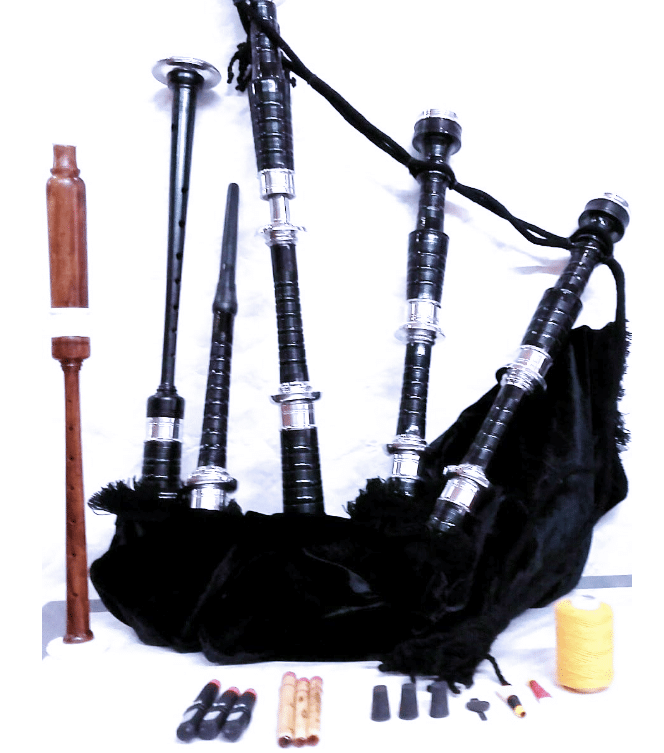
FEATURES:
- Made of high-quality rosewood
- Includes a synthetic pipe bag
- Comes with a carrying case
- Includes a tutor book and CD
Clan Tartan Bagpipes Starter Kit
- Perfect for beginners with everything needed to get started
- Produces a rich and warm tone
- May require additional tuning and adjustments before playing at optimal level
When you click ‘Check Price’, you’ll see there are loads of great places to buy this item. Our personal favorite is Sweetwater for the US, and Thomann and Gear4Music for the UK & Europe.
They are the largest music retailers, with excellent customer service, competitive prices, really fast shipping, and the longest guarantees.
The professional musician who wrote this article combined many things,
from the product build, manufacturer’s reputation through to feedback
from other users, to create our famous TedScore™.
TNYC Great Highland Bagpipes
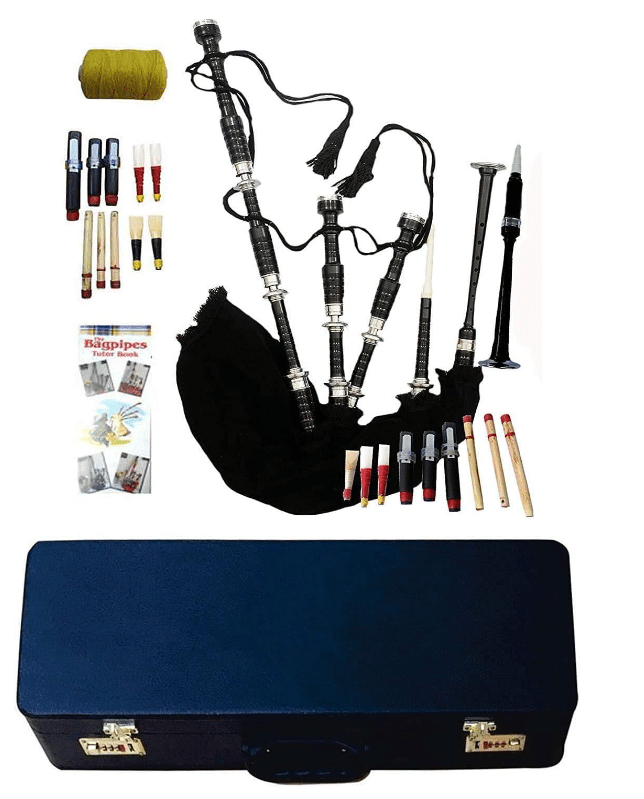
FEATURES:
- Crafted from premium rosewood for exceptional quality
- Equipped with a synthetic pipe bag for efficient airflow
- Complete with a durable carrying case for easy portability
TNYC Great Highland Bagpipes
- Produces a rich and warm tone
- Easy to play for starters
- May be heavy and difficult to hold for extended periods of time
When you click ‘Check Price’, you’ll see there are loads of great places to buy this item. Our personal favorite is Sweetwater for the US, and Thomann and Gear4Music for the UK & Europe.
They are the largest music retailers, with excellent customer service, competitive prices, really fast shipping, and the longest guarantees.
The professional musician who wrote this article combined many things,
from the product build, manufacturer’s reputation through to feedback
from other users, to create our famous TedScore™.
AJW Great Highland Bagpipes

FEATURES:
- Made from premium African blackwood
- Includes a synthetic pipe bag for efficient airflow and ease of maintenance
- Comes with a sturdy carrying case for convenient portability and protection
AJW Great Highland Bagpipes
- Produces a rich and powerful tone that is perfect for both beginners and professionals
- Includes a synthetic pipe bag for efficient airflow and ease of maintenance
- Comes with a sturdy carrying case for convenient portability and protection
- May be more expensive than other beginner sets, but the quality and sound are worth the investment
When you click ‘Check Price’, you’ll see there are loads of great places to buy this item. Our personal favorite is Sweetwater for the US, and Thomann and Gear4Music for the UK & Europe.
They are the largest music retailers, with excellent customer service, competitive prices, really fast shipping, and the longest guarantees.
The professional musician who wrote this article combined many things,
from the product build, manufacturer’s reputation through to feedback
from other users, to create our famous TedScore™.
McWilliams Professional Bagpipes
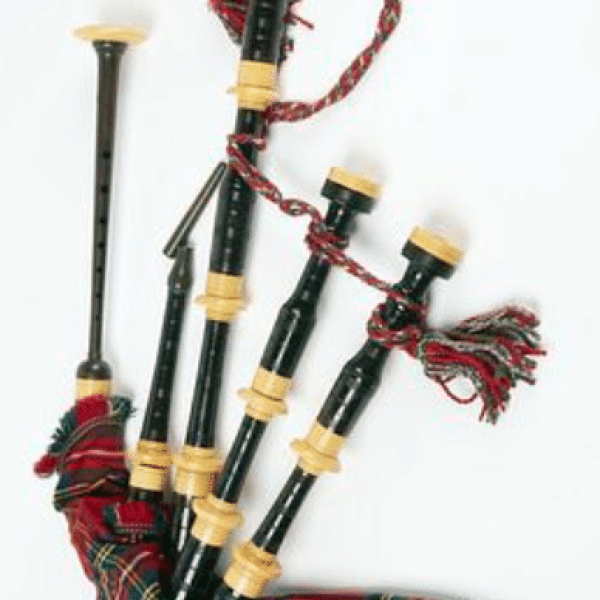
FEATURES:
- Made of high-quality blackwood and premium materials for exceptional durability and longevity
- Equipped with a synthetic pipe bag for efficient airflow and easy maintenance
- Comes with a stylish carrying case, perfect for transporting your bagpipes
McWilliams Professional Bagpipes
- Offers great sound quality and performance
- Boasts an intricate and detailed design to impress audiences
- Expensive
- Requires regular maintenance and upkeep to keep your bagpipes in top condition
When you click ‘Check Price’, you’ll see there are loads of great places to buy this item. Our personal favorite is Sweetwater for the US, and Thomann and Gear4Music for the UK & Europe.
They are the largest music retailers, with excellent customer service, competitive prices, really fast shipping, and the longest guarantees.
The professional musician who wrote this article combined many things,
from the product build, manufacturer’s reputation through to feedback
from other users, to create our famous TedScore™.
Care and Maintenance of Bagpipes
Proper care and maintenance of your bagpipes will not only improve their longevity but also their sound quality. Here are some tips to help you keep your bagpipes in top condition.
Tuning and Reeds
Playing bagpipes also requires a lot of physical stamina and coordination. It involves holding the bagpipes steady while playing, which can be tiring, especially for beginners.
You must also coordinate your fingers to play the right notes and maintain the right tempo. Developing the necessary physical stamina and coordination to play the bagpipes requires time and practice.
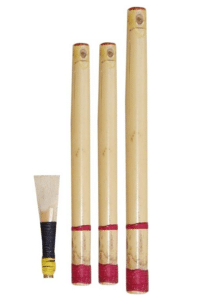
Temperature and Moisture Effects
Temperature and moisture can significantly impact the sound quality of your bagpipes. Extreme temperatures can cause the wood to expand or contract, affecting the tuning of your bagpipes.
Similarly, moisture can cause the wood to swell or crack, affecting the sound quality. Store your bagpipes in a dry and cool place to prevent temperature and moisture-related damage. Avoid exposing your bagpipes to direct sunlight, heat sources, or damp areas. Using a moisture control system to regulate the moisture level inside your bagpipes is also a good idea.

Regularly oiling your bagpipes can also help protect them from temperature and moisture-related damage. Use a high-quality oil, such as sweet almond or vitamin E oil, to lubricate the wood and prevent it from drying.
Cost of Learning Bagpipes
Buying Your First Bagpipes
When buying your first set of bagpipes, there are a few things to consider. Decide whether you want to buy a set of plastic or wooden bagpipes.
Plastic bagpipes are generally cheaper than wooden ones but are also less durable and can sound less authentic.
Wooden bagpipes, on the other hand, are more expensive but durable and produce a more authentic sound.
The cost of bagpipes can vary greatly, depending on the quality and materials used. A basic set of plastic bagpipes can cost around $/£200-300, while a good quality set of wooden bagpipes can cost upwards of $/£1000.

Cost of Lessons
The cost of lessons can also vary greatly depending on where you live and the teacher’s experience level. Private lessons can cost anywhere from $/£20-50 per hour, while group lessons can be cheaper at around $/£10-20 per hour.
Equipment
On top of your bagpipes are a few other pieces of equipment you will need to invest in. These include a practice chanter, reeds, and a carrying case.
A practice chanter is a small, pipe-like instrument used to practice finger movements and basic tunes. A good quality practice instrument or chanter can cost around $/£50-100.
Reeds are an essential part of the bagpipes (and most instruments of the woodwind family) and must be replaced regularly. A set of reeds can cost around $/£20-£30.
A carrying case is also necessary to protect your bagpipes during transport. A good quality carrying case can cost around £50-£100.
Are Bagpipes Hard to Play?: A Recape
Summary
Learning to play the bagpipes is an exciting journey filled with challenges and rewards.
I’ve found that patience and regular practice are crucial for mastering the instrument. Playing the bagpipes can also improve your breathing and overall physical stamina.
Joining a piping community can provide valuable support and motivation. The joy and sense of accomplishment from playing well are genuinely inspiring.
Take it step-by-step, starting with the basics before progressing to more complex tunes. Embracing the challenge and enjoying the music you create will pay off in the end!
Before you go…
If you’d like to find out more information on Bagpipes for beginners – look at our new article here.
FAQ's
Learning to play the bagpipes can take several months to a few years, depending on your dedication and practice routine. Simple rhythms can be learned in a few months, while more complex songs can take over two years to master.
While it’s possible to teach yourself to play the bagpipes, taking lessons from a qualified instructor is highly recommended to ensure proper technique and avoid developing bad habits. A good instructor can also provide valuable feedback and guidance to help you progress faster and more efficiently.
Playing the bagpipes is notoriously difficult due to the unique nature of the instrument, which requires good lung capacity, control over breathing, and the ability to play the correct notes while squeezing and blowing simultaneously.
Yes, strong lungs are essential for playing the bagpipes as it requires a lot of air to be blown into the bagpipes to produce sound, and the player must maintain steady pressure while playing. Good breathing control is also necessary to create the distinct sound and rhythm of the instrument.











I found your segment on the types of bagpipes fascinating! It’s amazing how many varieties exist and how they reflect the culture and history of their regions. It makes me appreciate the instrument even more. Thanks for sharing, Robert Emery.
Absolutely, BeccaLoo82! The diversity in bagpipe music across different countries is so rich and engaging. If you ever get the chance, attending a live performance is exhilarating!
Spot on, BeccaLoo82 and PiperFan101! Each bagpipe type brings its own unique sound and playing techniques. For anyone interested in deepening their understanding, I highly recommend exploring each type’s historical context. It adds so much to the appreciation of the music.
This article on bagpipes took me right back to my trip to Scotland! Something magical about the sound that echoes through the highlands. Would love to try and learn someday. Any tips for absolute beginners who aren’t musically inclined?
hey robert emery, really cool piece on bagpipes! i’ve always thought they had a unique sound, but i didn’t know there were different types. could you explain a bit more about how each type varies? like, is one easier for beginners or does it depend on the kind of music you wanna play?
Mackenzie, great question! From what I’ve experienced, the Highland bagpipes are more traditional and have a steep learning curve, but there are simpler versions like the practice chanter that beginners start with. Definitely depends on the music style you’re interested in.